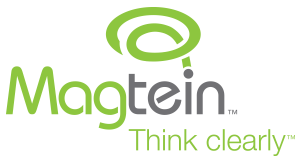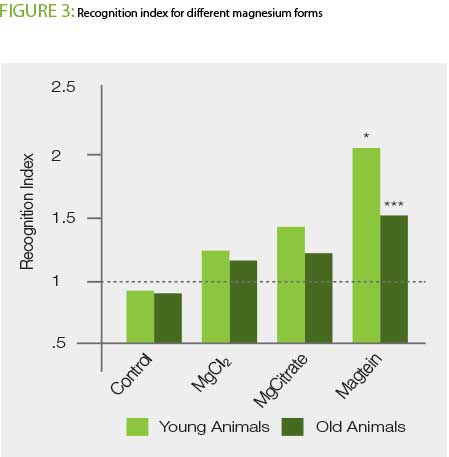Magtein® is the only form of magnesium proven to enhance brain magnesium levels, resulting in enhanced cognitive function.
 Magtein is a special, branded form of magnesium that is able to reach the brain. This Magtein review details its advantages over plain magnesium supplements:
Magtein is a special, branded form of magnesium that is able to reach the brain. This Magtein review details its advantages over plain magnesium supplements:
- Brain bioavailability. Magtein is the only magnesium form patented and proven to enhance brain magnesium concentrations and improve cognition.
- Research evidence. Magtein’s nootropic benefits are backed by animal and human research studies.
Overview
Magtein, also known as magnesium L-threonate, is a patented form of magnesium made by American biotech company Magceutics. This essential nutrient is involved in many life-essential processes, including the proper functioning of the brain. However, standard forms of magnesium have low brain bioavailability, meaning that they are unable to effectively reach the brain.
Magtein’s high bioavailability solves this problem, allowing it to raise the brain’s magnesium levels and result in improved cognitive function. So far, several animal studies and a single human trial have demonstrated that Magtein can fight cognitive decline and dementia in the elderly, and even enhance memory and learning in healthy, young animals.
Researchers believe that magnesium L-threonate works by enhancing the function of synapses – junctions found between brain cells that play a critical role in learning and memory. In particular, magnesium has been shown to support synaptic density and plasticity – the ability of synapses to strengthen or weaken over time.
Magtein Patents
The preparation of magnesium L-threonate and its use in foods and supplements is covered by US patent 8178132.
Cognitive Function/Neurological Disorders
This patent supports the use of Magtein for magnesium deficiency and a range of cognitive disorders that includes mild cognitive impairment, Alzeimer’s, Parkinson’s, ALS, attention deficit hyperactivity disorder (ADHD), anxiety disorder, and mood disorders. In addition, it is also said to help with diabetes, migraines, and hypertension (US patent 8178118).
Magtein Nutritional Supplement Uses
Nootropic Supplements
Because Magtein is unique for its ability to raise magnesium concentrations in the brain, it is mainly used in nootropic supplements. magnesium L-threonate products are meant to help with cognitive decline, mild cognitive impairment, Alzheimer’s, Parkinson’s, ALS, depression, ADHD, migraines, and anxiety disorders. In addition, magtein is also targeted at healthy individuals looking to boost their overall cognition and memory in particular.
Magtein Brand Advantages
Compared to standard forms of magnesium, magtein offers advantages such as:
- Brain bioavailability: Magtein was demonstrated to improve brain magnesium levels, whereas other forms of magnesium failed to do so
- Research evidence: Magtein is the only form of magnesium demonstrated to improve memory, learning, cognitive impairment, and other aspects of cognitive function in research studies.
- Safety: Magtein is Generally Recognized as Safe (GRAS) by the FDA, highlighting its safety for nootropic supplementation.

Magtein Research
Animal Research
Animal studies demonstrate that Magtein is able to raise brain magnesium levels, which results in cognitive benefits such as enhanced memory and learning.
Magtein appears to raise brain Mg levels and improve learning and memory in rats
This animal study examined the effects of magnesium L-threonate supplementation on memory and learning. Young and old rats were split into groups receiving standard diets or diets enriched with basic forms of magnesium or Magtein for 24 days. Only rats given Magtein experienced a rise in brain magnesium and showed improved performance on tests of learning and memory. These findings were accompanied by enhancement of synaptic plasticity and long-term potentiation – two mechanisms that play a central role in learning and memory.
- The researchers concluded that “…an increase in brain magnesium enhances both short-term synaptic facilitation and long-term potentiation and improves learning and memory functions.” 1

Magtein appears to alleviate Alzheimer’s in mice
This animal study analyzed the benefits of Magtein for Alzheimer’s. Mice with Alzheimer’s were given magnesium L-threonate daily for a month, and underwent tests of cognitive function before and after supplementation. Magtein supplementation reversed memory and learning deterioration and was even effective in mice with late-stage Alzheimer’s. Moreover, the improvement was associated with reduction of Aβ-plaques and synapse loss – two hallmarks of Alzheimer’s.
- The researchers concluded that “…elevation of brain magnesium exerts substantial synaptoprotective effects in a mouse model of Alzheimer’s disease, and hence it might have therapeutic potential for treating Alzheimer’s disease.” 2
Magtein may help with anxiety disorders in mice
This study looked at the usefulness of Magtein in helping with anxiety disorders such as PTSD through its effects on fear conditioning. Mice were supplemented with Magtein for a month and underwent tests of fear conditioning. Supplementation was found to improve retention of fear memory extinction, meaning that it helped the animals control their fear responses.
- The researchers concluded that “…elevation of brain magnesium might be a novel approach for enhancing synaptic plasticity in a regional-specific manner leading to enhancing the efficacy of extinction without enhancing or impairing fear memory formation.” 3
Human Research
Magnesium L-threonate (1.5-2 g) appears to alleviate cognitive decline in older adults
This randomized, double-blind, placebo-controlled study examined the effects of Magtein (MMFS-01) on cognitive decline in older adults. A total of 44 participants (age 50-70) with mild cognitive impairment were given placebo or MMFS-01 (25 mg per kg body weight) daily for 12 weeks. Compared to placebo, the MMFS group experienced improvement of cognitive ability and and cognitive fluctuation – large fluctuations in mental capacity over time (such as having “bad days”). nearly restored their cognitive function to the level of healthy adults.
- The researchers concluded that “The current study demonstrates the potential of MMFS-01 for treating cognitive impairment in older adults.” 4
Magtein Dosage
- Single-ingredient supplements typically provide 2 g servings of magnesium L-threonate capsules containing 144 mg magnesium
- Multi-ingredient supplements mix different forms of magnesium and other nootropic compounds with smaller doses of Magtein (e.g. 1000 mg)
- The only human study of Magtein used doses of 25 mg/kg body weight, which translates to 1.5-2 g for most people
Supplements in Review Recommendation
- Magtein®, 2 g daily.
Magtein is the only patented, clinically-proven form of magnesium for supporting cognitive function. Unlike other forms of magnesium, Magtein has been proven to increase the brain’s magnesium levels and lead to benefits such as improved memory and protection against Alzheimer’s and other neurological disorders.
The only human study used daily doses of 1.5-2 g. Magtein’s manufacturer recommends splitting the 2 g dosage into two 1 g doses with a meal daily.
Leave a Reply